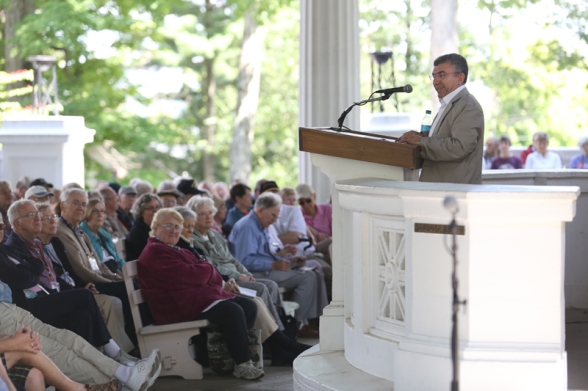Zeki Saritoprak is the Nursi Chair in Islamic Studies at John Carroll University. At 2 p.m. Friday in the Hall of Philosophy, he delivered an Interfaith Lecture on the Gülen movement and on Turkish culture and religion. Saritoprak is a contributing author of Turkish Islam and the Secular State: The Gülen Movement, edited by Hakan Yavuz and John L. Esposito.
 |
| (Photo: Brian Smith) |
Before discussing Fethullah Gülen and his Hizmet movement, Saritoprak gave a brief outline of Turkish history, from the start of the Ottoman Empire to the founding of the Republic of Turkey. He spoke on how Islam appeared in Turkey and on the religiosity of modern Turkish people.
Gülen became a prominent Turkish preacher and imam in the 1980s, Saritoprak said. People would come from hundreds of miles away to hear him speak. Gülen’s Hizmet movement is the largest civic movement in the world today, Saritoprak said.
Gülen has been successful in encouraging Turkish Muslims to establish and attend secular schools.
“Muslims have to establish … not religious schools, but just regular, secular high schools,” Saritoprak said, “because [Gülen believes] mathematics is talking about God, physics is talking about God, chemistry is talking about God.”
Among Gülen’s critics are Turks who feel he is not enough of a nationalist, Saritoprak said. Because of Gülen’s emphasis on interfaith dialogue and his connections with leaders of other religious traditions, some Muslims have accused him of secretly being a rabbi or a cardinal.
The Hizmet movement has opened its own schools to promote peace, nonviolence and tolerance, with at least 1,000 schools in Turkey and in more than 40 other countries, Saritoprak said.
“In the generation that [is being] educated in these schools … I think we have a good promise of our future,” he said.
He noted that the Hizmet movement has also opened hospitals and has been involved in relief efforts; for example, those in Haiti and New Orleans. The movement’s newspaper is one of the most widely read in Turkey, Saritoprak said.
Gülen has held meetings with figures such as the chief rabbis of Israel and Pope John Paul II, and he is generally respected among the Jewish and Christian communities for bringing Muslims into dialogue with those of other faiths, Saritoprak said.
“I think the most visible part — and sometimes criticized part — of this movement is interfaith dialogue,” Saritoprak said.
Published on The Chautauquan Daily, 18 August 2013, Sunday
Related Video
